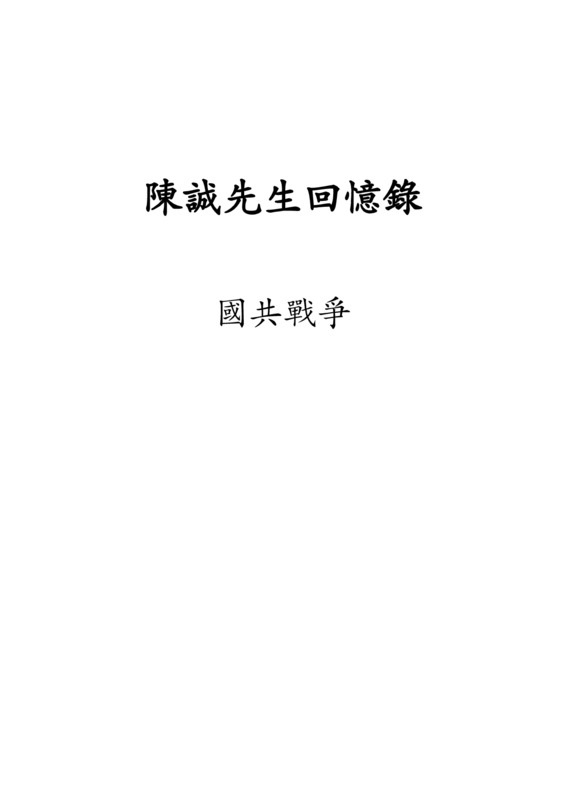Explore the collection
Showing 5 items in the collection
5 items
Book
Active Life
This is a collection of essays by Cui Weiping, a professor at the Beijing Film Academy. The title, inspired by Hannah Arendt, covers a wide range of fields from poetry and movies to politics and ethics, and tells the stories of fascinating people, the construction of their inner world and external lives. These people include Hai Zi, Wang Xiaobo, Arendt, Woolf, Beauvoir, Tarkovsky, Kremer, Herbert, Havel, and many others. Behind these seemingly unrelated names, there are hints of these two interdependent spiritual dimensions: on the one hand, the construction of the external world in which we live; on the other hand, the construction of our own inner world, which cannot be neglected. This book, published by Renmin University of China Press in 2003, has had a significant impact on the development of civil society in China.
Book
Chen Cheng's Memoirs—The War between the Nationalists and Communists
Mr. Chen Cheng (courtesy name Cixiu; alias Shisou) served as the commander of the KMT army, commander-in-chief of the group army, commander-in-chief of the theater of operations, and chief of the general staff of the KMT. After the defeat of the Kuomintang army in Taiwan, Chen Cheng served the Administrative Yuan as Vice President of the Kuomintang. The volumes associated with *Chen Cheng's Memoirs* were published by Taiwan's National Museum of History in 2005. The series is divided into six volumes: *The Northern Expedition and the Chaos* (one volume), *The War between the Nationalists and Communists* (one volume), *The War of Resistance Against Japanese Aggression* (two volumes), and ***The Construction of Taiwan*** (two volumes). The first volume, *The War between the Nationalists and Communists* includes three parts: *Suppressing the Communists - Memories of the Military*, *Summary of Mr. Chen's Words and Actions*, and *Correspondence and Telegrams*. The book has original historical materials related to the five sieges and the counter-insurgency. In particular, this is the first time that important historical materials regarding the correspondence between Chiang Chung-cheng (courtesy name of Chiang Kai-shek) and Cixiu have been made public.
Article
Facts of the 1958-1962 Disaster in Fengyang County, Anhui Province
The author of this book, Luo Pinghan, is a native of Anhua County, Hunan Province. He graduated from the Party History Department of Renmin University of China and served as director and professor of the Party History Teaching and Research Department of the Party School of the Central Committee of the Communist Party of China. This book was published by Fujian People's Publishing House in 2003.
With Mao Zedong's affirmation, the system of people's communes was rapidly promoted across the country in 1958. At that time, the people's commune was both a production organization and a grassroots political power. Its rise and fanatical development are closely related to the subsequent Great Famine.
As a scholar within the system, the author’s view of history also belongs to orthodox ideology. Although this book is narrated from the official ideology of the CCP, it uses rich and detailed historical materials to comprehensively and systematically introduce the history of the People's Communes, giving it a reference value for a comprehensive understanding of this movement.
Article
Memorandum on "Three Years of Natural Disasters"
The years 1959-1961 were very unusual in the history of disasters in China and the world in the 20th century. Anyone who has experienced it will recall the starvation years and the days when people starved to death everywhere. However, due to official concealment and denial, the number of people who died in this disaster has never been officially announced.
The purpose of Jin Hui's article is to estimate the number of unnatural deaths during the three years of the 1959-1961 disaster in China. Based on public data released by the authoritative National Bureau of Statistics in China Jin concludes that about 40 million people died, which roughly matches studies by foreign scholars, who have estimated up to 45 million.
Film and Video
Working toward a Civil Society (Episode 5): Cui Weiping
The Xi’an-based videographer Zhang Shihe, or Tiger Temple, has been a fixture on the independent Chinese history scene for more than twenty years. In 2010, he began a thirty-part series of short interviews with leading Chinese thinkers called “Working Toward Civil Society,” in which he explores how China can build a true civil society. Some of those interviewed have now been silenced, passed away, or moved abroad, making the series itself a work of history.
In this episode, Zhang interviews one of China’s most thoughtful public thinkers, Cui Weiping. Cui is a professor at the Beijing Film Academy, and translator of Havel into Chinese. She was a signer of Charter 08, and friend of the late Nobel Peace Prize laureate Liu Xiaobo. Although the interview is only 8 minutes long, Cui touches on some of the key problems that continue to plague China: how to break free of overwhelming government control of civic life?
Note to English speakers: this interview only has Chinese subtitles. The CUA is working to add English subtitles to all of our video offerings so check back in a few months.




